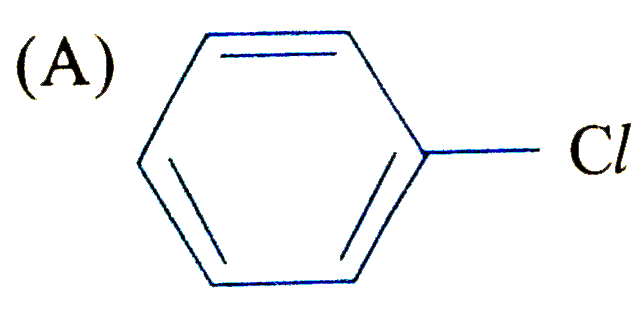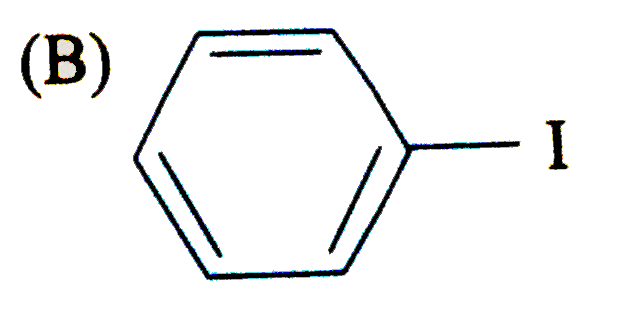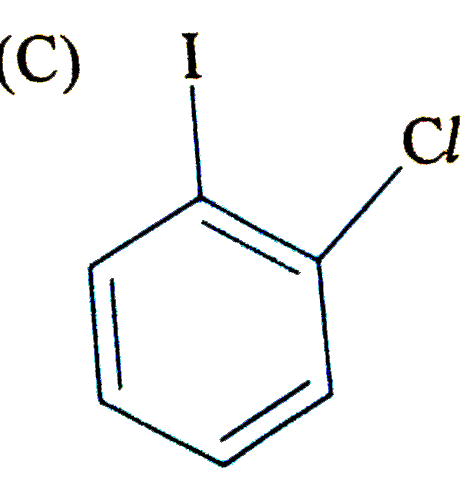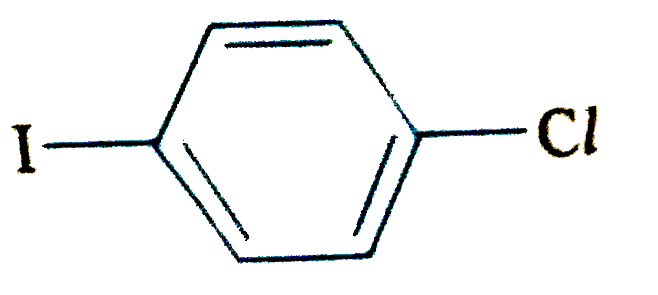The halide which will not react with benzene in presence of anhydrous AlCl3 is
CH3CHClCH3
C6H5CH2Cl
C6H5Cl
CH3 CH2CH2Cl
The correct Answer is:C
To determine which halide will not react with benzene in the presence of anhydrous AlCl₃, we need to analyze the behavior of different halides under Friedel-Crafts reactions.
1. Understanding Friedel-Crafts Reaction:
The Friedel-Crafts reaction involves the electrophilic substitution of an aromatic compound (like benzene) using an alkyl or acyl halide in the presence of a Lewis acid catalyst, such as AlCl₃. The halide reacts with AlCl₃ to generate a more reactive electrophile.
2. Analyzing Different Halides:
- Methyl Chloride (CH₃Cl):
- In the presence of AlCl₃, CH₃Cl loses Cl to form CH₃⁺ (methyl cation), which can react with benzene.
- Ethyl Chloride (C₂H₅Cl):
- Similarly, C₂H₅Cl will also lose Cl in the presence of AlCl₃ to form C₂H₅⁺ (ethyl cation), which can react with benzene.
- Chlorobenzene (C₆H₅Cl):
- Chlorobenzene, however, has a C-Cl bond that exhibits partial double bond character due to resonance. The lone pair of electrons on the chlorine atom can delocalize into the aromatic ring, stabilizing the C-Cl bond and making it less reactive. Thus, the bond does not break easily in the presence of AlCl₃, and therefore chlorobenzene will not react with benzene.
3. Conclusion:
The halide that will not react with benzene in the presence of anhydrous AlCl₃ is Chlorobenzene (C₆H₅Cl).
The Friedel-Crafts reaction involves the electrophilic substitution of an aromatic compound (like benzene) using an alkyl or acyl halide in the presence of a Lewis acid catalyst, such as AlCl₃. The halide reacts with AlCl₃ to generate a more reactive electrophile.
- Methyl Chloride (CH₃Cl):
- In the presence of AlCl₃, CH₃Cl loses Cl to form CH₃⁺ (methyl cation), which can react with benzene.
- Ethyl Chloride (C₂H₅Cl):
- Similarly, C₂H₅Cl will also lose Cl in the presence of AlCl₃ to form C₂H₅⁺ (ethyl cation), which can react with benzene.
- Chlorobenzene (C₆H₅Cl):
- Chlorobenzene, however, has a C-Cl bond that exhibits partial double bond character due to resonance. The lone pair of electrons on the chlorine atom can delocalize into the aromatic ring, stabilizing the C-Cl bond and making it less reactive. Thus, the bond does not break easily in the presence of AlCl₃, and therefore chlorobenzene will not react with benzene.
The halide that will not react with benzene in the presence of anhydrous AlCl₃ is Chlorobenzene (C₆H₅Cl).
Topper's Solved these Questions
- GENERAL ORGANIC CHEMISTRYBOOK - FIITJEECHAPTER - GENERAL ORGANIC CHEMISTRYEXERCISE - Section (II) [Jee mains]: With Single Correct Choice
78 Videos
- GENERAL ORGANIC CHEMISTRYBOOK - FIITJEECHAPTER - GENERAL ORGANIC CHEMISTRYEXERCISE - MORE THAN ONE CORRECT CHOICES
24 Videos
- GENERAL ORGANIC CHEMISTRYBOOK - FIITJEECHAPTER - GENERAL ORGANIC CHEMISTRYEXERCISE - SINGLE INTEGER ANSWER TYPE QUESTIONS
14 Videos
- GASEOUS STATEBOOK - FIITJEECHAPTER - GASEOUS STATEEXERCISE - MATCHING LIST TYPE QUESTION
1 Videos
- HYDROCARBONSBOOK - FIITJEECHAPTER - HYDROCARBONSEXERCISE - SINGLE INTEGER ANSWER TYPE QUESTION
9 Videos
Similar Questions
Knowledge Check
The halide which will not react with benzene in presence of anhydrous AlCl3 is
ACH3CHClCH3BC6H5CH2ClCC6H5ClDCH3CH2CH2ClBenzene on reaction with ICI in presence of anhydrous AlCl3 gives?
A B
B C
C D
D
Ansisole on reaction ith chloromethane in presence of anhydrous AlCl3 gives
Ao - methyl anisole and p - methoxy anisoleBp - methyl anisole and p - methoxy anisoleCo - methyl anisole and p - methyl anisoleDo - methoxy acetophenone and p - methoxy acetophenone
Benzene reacts with CHCl3 in the presence of arhydrous AlCl3 to form
View SolutionAnsisole on reaction ith chloromethane in presence of anhydrous AlCl3 gives
View SolutionBenzene reacts with CH3Cl in the presence of anhydrous AlCl3 to form
View SolutionBenzene reacts with CCI4 in presence of anhydrous AICI3 to give :
View SolutionWhich reaction is fastest with benzene in presence of AlCl3?
View Solution
